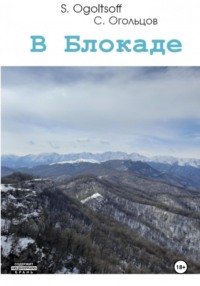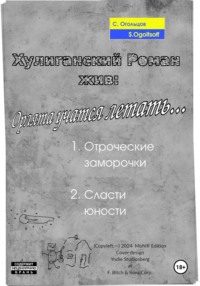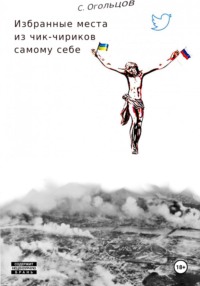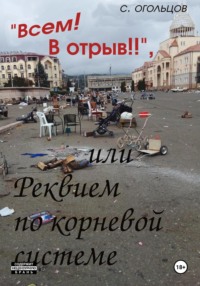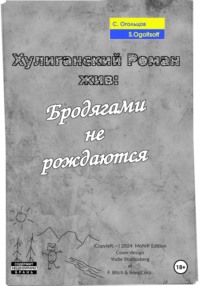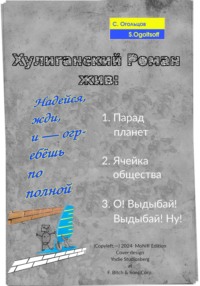
Полная версия
The Rascally Romance (in a single helluva-long letter about a flicking-short life)
As I was a big boy already, Dad instructed me to throw the wood pieces into the pit so that he could drag them thru the hole down into the basement. Dropping them in, I could not see him, but heard his voice from down there when he shouted me to stop if the pile of chunks in the pit threatened to block the hole. Then I waited until there came muffled thuds of the pieces toppling onto the cemented floor in the basement corridor.
Everything went smooth and easy before Natasha told Sasha that they had brought the firewood for us and I was helping Dad to move the wood down there. Sasha came running to the heap of log chunks and started dragging them and dropping into the pit. To all my furious clarifications that he was violating the age limits for this particular job, and that the very next chunk he dropped would surely block the hole, he answered with silent but obstinate snuffling and just went on.
(…any rhetoric is lost on those whose Stubbornness-Mommy was born a moment before them!. )
Yet, I not only made speeches but also kept throwing the wood, so that later, at midday meal in the kitchen, Sasha would not make hints that he did more than me. And suddenly he tottered back from the pit, his blood-smeared fingers clutching his face. Natasha rushed home to call Mom, who came running with a damp cloth to wipe the blood off Sasha’s upturned face. Dad also raced from the basement and no one was listening to my defense that all that happened accidentally, not on purpose, when the piece of wood thrown by me scratched the skin on my brother’s nose. Mom yelled at Dad because he allowed all that to happen. Dad also grew angry and told everyone to go home, and he'd finish the work himself.
The scratch healed very soon, although Sasha stubbornly peeled the patch off his nose even before the midday meal.
(…I doubt if my brother would recollect the happening, it’s only me who remembers and feels guilty: yes, it was not deliberate, but instead of futile orations I should have been more watchful tossing them chunks…)
At school, I regularly enrolled in this or that Group, whenever its tutor entered our classroom to recruit volunteers. Group meetings were held in the late afternoon so that participants had time to go home, have their midday meal, and come back to school. After a one-hour session of learning and training at the Group, its members returned home thru the complete night darkness…
One evening after the Group activities were over, a bunch of participants dropped into the school gym where there was an upright piano on the stage behind the closed curtain, and where one boy once showed me that if you hit only the black keys then it sounded like Chinese music. But that evening I forgot all about the music because besides the piano on the stage, there were several boys from senior grades who had a pair of real boxing gloves!
We dared to ask permission to touch the gloves’ shiny leather and try them on. The senior graders kindly allowed us that, and then they had an idea of holding a match between the sprats, a fighter from the Gorka (that is someone from the blocks atop the hill) against someone of Lowlanders who dwelt in the rows of timber houses at the foot of the Gorka upland.
The choice fell on me—O! and I wanted it so dearly!—and so did red-haired fatty Vovka from among the Lowlanders. As the stage was illuminated too poorly for the match, all the present went over to the gym hallway under the bright bulb reflected in the ink-black winter darkness behind the wide window-pane, and they commanded “box!” to me and Vovka.
At first, we both chuckled punching each other with the bulky balls of gloves, but soon we grew hot and angry. I in earnest wanted to deal a good one in his head while in his eyes in that very head you unmistakably could read his craving to knock me down. Before long my left shoulder, which kept receiving all his blows, felt terribly sore, while my right hand, that kept hitting his shoulder, grew limp and floppy. Probably, his state was no better, our giggles turned into puffing and gasping. It was bad and unbearably painful because his blows, like, penetrated to the very bone of my forearm, but I would rather die than beat retreat. At last, the big boys got bored with such a monotony, they told us “enough!” and took away their gloves.
The next morning a purple-black bruise decorated my left forearm and for several following days I was very touchy at that spot, ducking even from a friendly pat and issuing the hiss of self-defending gander…
~ ~ ~
If the Courtyard was covered by powder snow but not too deep, all of our family went out to clean the carpet and the runner. We spread them face down on the snow and stomped on their backs. Then the carpet was turned over, the snow from the snowdrifts about it got swept with a broom onto all of the carpet’s face and then swept away. Done. And we folded the carpet.
The long green runner remained face down after the stomping, and the 4 of us—Mom and the 3 children—gathered upon it, and Dad dragged the runner over the snowdrifts with all of us standing upon its back, leaving a crumpled, dust-smeared, furrow thru the snow in our wake. Yes, our Dad was so strong and mighty!
And making use of a slushy snowfall, the boys began to roll up snow in the Courtyard forming huge balls to build a fortress. For a start, you made a regular snowball, put it down onto a snowdrift, and began rolling it back and forth. The lump immediately swelled with layers of slush snow stuck all over its sides. The snowball turned bigger than a football, then grew above your knees, becoming denser, heavier and you had to call for help already and, in a team of two or three, roll it to the fortress construction site where the big boys hoisted it and fixed into the course of dense snow lumps making the circular wall taller than you…
We split into two parties—the besieged defenders and the assaulting troops. In a record short time, the ammo of snowballs was hurriedly produced and – off to the storm they rushed!
Shrieks, yells, babel; snowballs whooshing from all the sides and in every direction. I stuck my head out above the fortress wall looking for someone to hit with my snowball but a crack of yellow lightning flashed in my eyes, like an exploding electric bulb. With my back sliding against the wall, down I crouched, my hands firmly pressed to the eye whipped with a snowball.
(… " oh, I forgot, they killed me in the charge…”
so depicted such a moment Nikolai Gumilyov in his poem…)
Yet, the battle raged on, and no one cared about bodies of the fallen buddies. Everything fused and drowned in one united warcry, “A-a-a-a-a-ah!” After a period out of any time at all the battle was over. The fortress never surrendered but turned into a hillock of snow trampled firm and hard as ice. Yet, the roar still did not abated, with the same unrestrainable yell we kept sliding down the hillock on our bellies, the heads turned kinda hollow and filled with a sort of dull deafness because of your and others’ crazy, unceasing, howl, “A-a-a-a-a-ah!”
My eye could see already. I slapped up a snowball and hit the head of a boy older than me. What a blunder! Firstly, the battle was long since ended and that boy had already come with his skates on. How could I be so reckless? As always, because of trying to keep things in proper order, to make everything right. Ages before, at the beginning of fortress construction, the eldest boys—seventh-and-eighth-graders—announced, “who does not build will not play”, and I knew for sure that the boy in skates was not among the builders. But who now cared about the right things and justice? Many of the founder boys had left already. Those stuck behind had completely forgotten the pre-battle declaration.
Yet, there was no time to present justifications for the arrogant deed, and there was no one for listening to them or helping out, so – run for your life! And I plunged headlong towards the staircase-entrance door of our house. Maybe he wouldn’t catch up with his skates on in the trampled snow drifts?
Running, exhausted by the countless hours in the wild game, I was still running. The entrance door’s so nigh already! “But if he’ll still catch up?” flashed in my mind, and I got a skate kick in the ass for such an inappropriate fear. Slamming the door I shot thru the vestibule where he dared not follow – it’s someone else’s house…
(…if you want everything to work out as it should, you mustn’t doubt that so it would…)
In the spring that followed, my parents tried their hand at farming. That is, they decided to plant potatoes… When with a spade and a bagful of potatoes they started for the forest after work, I begged to take me too.
We came to the narrow endless clearing in the forest, the former border of Zona before the expansion of the Object’s area. Dad made holes in the soil which he turned the day before, and Mom dropped potatoes into them. Their faces looked sad and Dad wistfully shook his head asserting that the soil was not the right sort, mere loam on which nothing could possibly grow… Soon, the quiet spring twilight thickened, and we started home.
(…a little anticipatory, I can say that the attempted kitchen garden indeed yielded nothing. Was the failure because of the loam, or the doubt annulled any possibility for a success?.
And, what is really inconceivable, why was to start it at all? To save costs for potatoes? But we were not so poor then. In the parents’ room there appeared a fold-out couch-bed, two armchairs with lacquered armrests of wood, and a three-legged coffee table, all of them making one furniture set.
Probably, they simply wanted to take a break from all that furniture and the farming enterprise served an excuse for fleeing to the forest…)
~ ~ ~
And again it was summer only this time it started much earlier than in all the previous years. And together with that summer, the Rechka river rushed into my life. Or maybe, the limits of my living space had expanded enough to reach it.
To start the relations with the Rechka, at first, I needed a company of boys more advanced in their years who led along the downhill road avoiding the heat-softened tar in the joints, which leg I knew well though from my frequenting the Detachment’s Library. Then forked an unknown footpath thru the shady thicket over a steep slope until there, all at once, unfurled the sparkling sunlit stream of the Rechka lapping among innumerable boulders of any size.
You could cross the ten-meter-wide river without getting deeper than to your waist or you might stand instead knee-deep in its fast current and watch a school of translucent whitebait poking ticklishly at your ankles in the greenish twilight of the incessantly rolling mass of water…
When out of the river, we played Key-or-lock, betting on the form of the splash made by a stone hurled into the water. If the splash rose up like a stick, that was counted “a key”, while a wider, bush-like, splash went for “lock”. In controversy cases, the last word remained by the boy who played football better, or whose pebble did more leaps at “baking pancakes” over the water surface… Soon I began to go to the Rechka alone or with just one partner, yet on the river bank we parted because our main concern was fishing.
All the tackle consisted of a fishing pole—a cut-down willow whip—with a length of line tied to the thinner end. The line was threaded thru the float and ended with the hook, accompanied by a tiny lead sinker. The float could be made of a brownish wine cork, a match stuck into the same hole by side the threaded line fixed its length from the hook, or you could use a float bought from the Sports Goods store—a plucked and pared goose feather painted red-and-white with 2 tiny rubber rings to keep it fixed on the line—they both popped equally well on the rushing ripples of rapid current, or turned thoughtfully still in a small backwater pockets behind the bigger boulders…
Fishing is something personal. One boy pins his hopes on that quiet inlet, the other prefers to have his float hopping on the rapids. That’s why companions get parted on the river bank. Fishing is a rocket-fast surge of excitement at the slightest start of the float. Hush! Striking!. The line does not yield, it jibs, bends the pole end, cuts the water in zigzags, then suddenly gives up, jumps out and, in a fleeting arch over your head, carries to you the sparkling flutter of the caught fish! Then, of course, it turns to be not a fish but a small fry. Never mind! The next catch will be tha-a-at big!.
More often than anything else there was one of the “miserables” on the hook. I never learned their scientific name. Those fools got caught even on a bare hook, without any bait at all. And they could be hooked at any part of them—at the tail, or the belly, or an eye. Who would bother classifying such a moron minnow?
Back from fishing, I usually brought half-dozen of small fry sleeping in a milk-can, and Paulyna Zimin’s cat devoured them with greedy purr-and-snap from a saucer tap-tapping at the landing tiles….
That day I started fishing from the bridge between the Pumping Station and Checkpoint on the road out from the Zona. As usual, I walked after the current, refreshing the bait, adjusting the depth of the hook immersion. Being a steadfast fisherman, I only once allowed myself get distracted from bobs and jerks of the float in the current. It happened on the sandy spit nearby the green bush, where I carried out some restoration work mending the sand sculpture of a woman stretched on her back.
The masterpiece was created a couple of days before by 2 soldiers. You could guess at a glance that they were soldiers because of their black underpants and black high boots. Who else would wear such boots in summer?. So I increased the sagging breasts and slightly rounded the hips of the sculpture. They seemed wider than necessary but I did not correct it.
Why did I do it at all? Very clear, it’s not right to let the work of art disappear in the rest of the sand with all the soldiers’ labor gone to ashes…
(…or was I hooked by the opportunity to spank a female bust and thighs even if just made of sand?
Eew! To hell with Freud and other miserables from psychoanalytic schools!
Let’s go back fishing, it’s much more fun…)
…and I did not roll on top of her like one of the soldiers two days before, but just returned to fishing.
The current carried the float to the broken dam below the stadium, where ages ago I stumbled off the insidious slab. The point marked half of the Rechka having been passed already and after the other half it would run beyond the Zona, away from the barbed wire over 2 parallel rows of poles, breaking out thru the strip of loosened ground in between the wire-walls for catching the footprints of NATO spies. Half of the walk along the river was over and the three-liter milk-can contained just a couple of “miserables”. The neighbor’s cat would be disappointed.
When down the stream there loomed the second (and also last) bridge in the Zona, I decided not to go any farther but try my luck at the sharp bend of the current under the precipitous drop-off in the bank. And right there happened that after what folks go fishing at all. The float did not twitch or flinch but went under the surface deep and slowly. I pulled back and the vibrating pole in my hands responded with the strangely unyielding resistance. No fish jumped from the water wiggling in its flight over the air. I had to pull the tight line all the way closer and closer and finally drag it onto the dry land… The fish twisted and arched and beat the sand, scaring me by its might and size, never had I seen the like of that dark blue piece of alive thick hose.
I threw the “miserables” back to the river, filled the can with water, and lowered the pray into it but the fish had to stand there upright—its length did not allow for tumbling in the can. 2 boys came from the bridge, they had already finished fishing and were on their way home. They asked me about the catch and I showed them the fish. “Burbot!” without a sec of hesitation identified one of them.
When they left, I realized that I couldn’t catch anything better, that it was time to cut the line and go home… I walked ascending the Gorka and the glory ran before me—a couple of boys jogged for a couple of hundred meters to meet before the Block. They wanted to take a look at The Burbot. And when I was already nearing our house, an unfamiliar auntie from the corner building stopped me on the walk to ask if that was true.
She peeped into the can at the round muzzle of The Burbot turned asleep by that time, and asked me to give it to her. I immediately handed the milk-can over and waited while she carried the fish to her home and brought the can back, because it’s only right to do what you’re told by grow-ups….
~ ~ ~
In those years, a year was much longer than nowadays and it was packed with bigger number of memorable events. For instance, in the same summer with The Burbot my sister, and brother, and I went to the pioneer camp, though we were not young pioneers yet.
One sunny morning the children from our Block, and from the twin one, and the Lowlander-children from the wooden houses by the foot of the Gorka upland collected at the House of Officers where two buses and two trucks with canvas tops were waiting for us. Parents gave their respective children suitcases with clothes, and bags full of sweets and other tasty things, and waved after the departing convoy.
We went over the bridge at the Pumping Station and passed the white gate of Checkpoint, leaving the Object behind the barbed wire that surrounded all of it together with the forest, hills, marshes and a stretch of the Rechka.
After Checkpoint, we turned to the right, climbing a protracted slant of the highway which we followed for about half an hour before another turn to the right to follow a dirt road in the forest of great Pine trees. There, the convoy had to slow down and, after a twenty-minute ride, we drove up to another gate in another fence of barbed wire. However, that fence wasn’t doubled, and there were no sentries at the gate because it was a pioneer camp.
Not far from the gate, there stood a one-story building with the canteen and the rooms for caretakers, and paramedic, and Camp Director, and other employees at the camp. Behind that building, there stretched a wide field marked by a tall iron mast of “giant leaps” crowned with the iron wheel from which there hung half-dozen canvas loops on thoroughly rusted chains because no one ever used the attraction. Beneath the row of tall Birch trees along the left edge of the field, there ran a neat cinder path to the pit for broad jumps. Across the field, the forest began again, parted from the camp by the couple lines of barbed wire nailed randomly to thicker trunks among the trees.
To the left of the canteen building, a growth of green bushes screened 4 square canvas tents with 4 beds each on the lining-board floor for the ninth-graders from the first platoon.
Then followed a level clearing with another iron mast, this time more slender and without chains but with one thin cable looped trough two small pulleys—atop the mast and near the ground—for the Red Flag of the camp. Each morning and each evening the platoons were lined-up along three sides of a large rectangular, facing inside. The iron mast, Camp Director, Senior Pioneer Leader, and the camp accordionist concluded the rectangular as the fourth—fairly rarefied—side of the perimeter. The commanders of the platoons, starting with the youngest, approached, in turn, Senior Pioneer Leader to report that their platoon was lined-up. During their report, both the commanders and Senior Pioneer Leader held their right elbows up, hands straightened and kept diagonally across their respective faces.
With the reports received from the commanders of all lined-up platoons, Senior Pioneer Leader made several steps ahead towards the center of the formation, yet without reaching it turned around and approached Camp Director to report that the camp was lined-up, and Camp Director responded with the order to hoist or to pull in the Red Flag of the camp, depending on the time of day.
The accordionist stretched the bellows of his instrument and played the hymn of the Soviet Union. Two rank-and-file pioneers called out by Senior Pioneer Leader for their recent achievements and overall merits in the camp life approached the mast. Standing on both sides from it, they pulled the cable running thru 2 pulleys, their hands taking turns at grabbing the cable, and the Red Flag of the camp crept in starts and jerks along the mast, up in the morning and down in the evening, while the lined-up formation stood with their right elbows up, hands straightened and kept diagonally across their respective faces, even Camp Director, caretakers and kids from the youngest platoon though none of them was age eligible for this pioneer salutation…
The clearing with the flag mast was followed by a short tilt, down which there stood a long squat barrack of timber with two large bedroom-wards separated by the central blind partition and filled with rows of spring-mesh beds abutting the windowed sidewalls. Each of the wards ended with the door to the shared square room comprising the whole width of the barrack. There was a small stage with a screen for movie shows and rows of seats for the audience.
Entering the bedroom-wards on the day of arrival, the children were not in a hurry to go and get mattresses, sheets, and blankets from the canteen-etc. building, but instead, they dropped their bags and suitcases on the floor and went amok, leap-racing along the spring-mesh trail of the lined beds which tossed you up in long jumps thru the air. For that particular sports activity, it’s vitally important not to collide with a jumper rushing in the opposite direction…
Then everyone opened their suitcases and bags and started to enjoy the sweets, flashing them down with the gulps of treacly condensed milk from blue-and-white tin-cans. As it turned out, for condensed milk consuming, neither an opener nor a spoon was needed. Just find a nail sticking out on the wall and hit against it the upper-side round part of the can, to punch a hole. Make sure the hole’s location is near the top rim and not in its center. Produce another hole in the top opposite to the first one and—here you are!—now the condensed milk can easily be sucked out thru any of the holes without smearing your lips and cheeks, as when eating with a spoon from an open tin-can… And if you are not a well-trained puncher, or not tall enough to reach the nail up in the wall, then ask someone of the elder boys – they would punch it for you for just a couple of hearty sucks from your can…
The middle of the square where the camp’s platoons fell in was reserved for patches of loosened ground, a patch per platoon. Each day children laid out the date in their platoon's patch with green cones, or fresh twigs, or chopped off flower heads competing for the Best Designed Platoon Calendar.
On Sundays, a big bus was bringing to the camp a pack of parents to treat their children with gingerbread, and sweets, and – lemonade!
Our Mom was taking us over into the greenish shade of trees and watched as we chewed and swallowed, and asked questions about the camp life, while Dad clicked his brand new FED-2 camera. Consuming the treats, we were sharing that the camp life was quite like a camp life. That not long before, all the platoons went out for a hike in the forest and on our return – surprise! There was a restaurant waiting for us on the floor-boarded platform of the pergola, outside the cinema room in the barrack.
As it turned out, the girls from the senior platoon did not participate in hiking and instead set up tables and chairs in the pergola, and cooked the dinner together with the canteen workers. Handwritten menu sheets were put on the tables, and everyone sitting around them summoned the girls with the adult word “Waitress!” And they approached to get the order for “May Salad” or “Onion Salad”, the only two items on the menu.
When the restaurant was over, I accidentally overheard two of the waitresses giggling between themselves that everyone asked for “May Salad” while “Onion Salad” was way more delicious and thus the waitresses’ share became bigger thanks to the fools easily hooked by mere look of words on a piece of paper.


